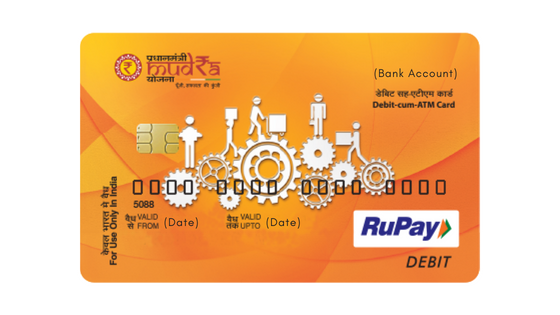Aim and Purpose of Mudra Loan
The Indian government is keen to encourage innovation and development in the small and micro business sector in India. As part of this initiative, on 8 April 2015, the government launched a financial aid scheme known as the Pradhan Mantri Mudra Yojana (PMMY), also called the Mudra Yojana or Mudra loan scheme.
Mudra is the acronym for Micro-Units Development & Refinance Agency Limited, which is also known as Mudra Bank and which is a subsidiary of the Small Industries Development Bank of India (SIDBI). Its purpose is to oversee the PMMY at the national level, along with the Department of Financial Services (DFS), and maintain the data pertaining to this. At the state level, the PMMY is monitored by the State Level Banker’s Committee (SLBC) forum.
It is important to note that Mudra does not give any loans itself, but, refinances government-approved Indian financiers and financial institutions and facilitates their disbursement of the Mudra loans to the small businessmen and entrepreneurs that apply for them. In India, institutional financial credit for small business initiatives has always been low as compared to that received by the large and corporate business sector. The Mudra loan scheme is meant to correct this imbalance.
Through the Mudra loan scheme, the Indian government offers financial assistance of up to 10 lakh rupees to non-agricultural and non-corporate businesses. According to a National Sample Survey Office (NSSO) survey conducted in 2013, the Indian non-corporate business sector includes 5.77 crore small businesses, and a large percentage of these businesses are owned and operated by people from marginalized communities.
These businesses, according to Mudra, have a combined annual revenue of 6.28 lakh crores, and, with adequate funding for existing and new businesses, this sector is expected to boost the Indian economy further and create more employment opportunities for Indian citizens.
Mudra Loan Details
- Indian banks, Non-Banking Financial Companies (NBFCs), Microfinance Institutions (MFIs), and other Mudra approved financial bodies can provide Mudra bank loans in accordance with the Reserve Bank of India (RBI) guidelines.
- The Mudra loan scheme is only for small businesses that are non-corporate in their structure and which are engaged in non-agricultural business activities. Incidentally, businesses involved in allied agricultural activities like horticulture and bee-keeping can avail of the Mudra loan scheme.
- Small businesses requiring financial credit of up to 10 lakh rupees can apply for a Mudra loan.
- Applicants are required to fill loan application forms to apply for the Mudra bank loan. It can be printed or downloaded from the Mudra website or from the sites or offices of the financial institutions providing the loans. Applicants can also make an online loan application at the Mudra Loan Portal – https://mudramitra.in/
- In their loan application, loan applicants must include necessary documentation such as a business plan, business documents, bank documents, and personal identification documents.
- Applicants must make the loan application personally. There is no requirement for any middlemen and loan agents for creating a Mudra Bank Yojana application.
- Applicants to the Mudra loan scheme do not need to furnish collateral security for obtaining the loan.
- Based on the merits of their loan application, the applicants may receive sanction for one of the three Mudra loan schemes – Shishu, Kishor, and Tarun.
- There are different interest rates and repayment terms for the Mudra loan schemes, and their repayment capacity and credit history determine the rates and terms for individual applicants.
Mudra Scheme
There are three Pradhan Mantri Mudra loan schemes, and these apply to businesses according to the size and the operational level of the business. The Mudra scheme details are as follows-
Three Mudra Loan Schemes
Only upcoming, recently launched, and nascent stage small businesses can apply for the Shishu mudra loan scheme, and they don’t need to pay any upfront fees or processing charges for the loan application. The loan application form is available in a single page format. If the loan applicants are found eligible, they can receive loans of up to Rs. 50,000. The loan is processed in two weeks and has to be repaid in five years at an interest rate of 1% per month or 12% per year.
[If you are planning to start and register your business, check out our article on New Company Registration in Mumbai]
Kishor
The Kishor loan scheme offers loans from Rs. 50,000 to Rs. 500,000 to already set up businesses that require financial aid to establish themselves on a stronger footing in the market. The loan application form is available in a three-page format, and some banks and financial institutions may charge upfront or processing fees for the loan application. On successful application, the loan gets processed in four weeks. The loan repayment time and interest rates are determined by the financial institution disbursing the loan and can vary for individual applicants according to their credit history and their business cash flow.
[Business (small or big) shall expose to GST as it is an essential thing required for business growth. Gain an in depth information about GST from our article What is IGST, CGST and SGST]
Tarun
Already established businesses seeking to expand their commercial operations can apply for loans ranging from Rs. 500,000 to Rs. 10,00,000 under the Tarun loan scheme. The application form comes in a three-page application format, and, depending on the financial institution and their internal guidelines, applicants may have to pay an upfront fee or processing charge with the loan application. Successful applicants receive the loan amount in four weeks. The loan-providing financial institutions assess each applicant’s credit history and determine the repayment time and interest rates accordingly.
Businesses, whether established or not, has to file a compliance i.e. the Financial Statement and other legal information to keep a track on the yearly performance. Hence, it is mandatory to File Annual Compliance of that particular business.
Mudra Loan Interest Rate
Aside from the Shishu loan scheme, which has fixed interest rates of 12% p.a., Pradhan Mantri Mudra Yojna interest rates are variable and are dependent on the discretion of the bank or financial institution extending the loan.
One of the reasons why different banks and financial institutions have different interest rates for Mudra loans is that these loans require no collateral and the lending bodies, therefore, have to calculate the credit risk based on the loan applicant’s finances, credit history, and previous business profits. Since these are different for different people, the interest rates that are set for them are also different.
The banks and financial institutions also set their interest rates following RBI guidelines. RBI’s Base Rate and Marginal Cost of Fund-Based Lending Rate (MCLR) fluctuate and since banks and financial institutions base their interest rate limits on the Base Rate and the MCLR, their fluctuations cause the Mudra loan interest rates to vary as well.
Applicants should check the current Base Rate and MCLR on the RBI website, and find out at what level concerning these their financial lending institution caps their Mudra loan interest rate. Public and private commercial banks generally cap their interest rate at the same level, while co-operative, rural, and regional banks can go 3.50% higher. Large microfinance institutions with 100 crore rupees loan portfolios have interest rate limits of 10%, and smaller microfinance institutions can charge interest rates of 12% or interest rates that are 2.75 times the average base rate of five major commercial banks.
NBFCs can go up 6% over the Base Rate and MCLR, and charge up to 15.45% interest.
Financial Institutions That Can Offer Mudra Loan
The DFS has authorized all Indian banks to provide eligible applicants with Mudra loans of up to 10 lakh rupees.
The government-authorized Indian banks include scheduled commercial banks, state cooperative banks, regional rural banks, public sector banks, private sector banks, and foreign banks.
Other financial institutions that can provide Mudra loans include co-operative societies, NBFCs, MFIs, Trust companies, and Section 8 companies.
Mudra Loan Eligibility
- Criteria for Providing Mudra Loan
- The financial institutions must have a net worth of 100 crore rupees.
- The financial institutions must be able to show a steady track record of profits for three years in a row.
- The financial institutions must have gross non-performing assets (NPAs) of 3% or less.
- The financial institutions must have a 9% Capital to Risk-weighted Asset Ratio (CRAR) at the very least.
- Criteria for Applying for Mudra Bank Loan
- The applicant must be a legal citizen of India.
- The applicant must be legally an adult; that is, at least 18 years old or older.
- The applicant must not have defaulted on any previous bank loans.
- Applicants must have a well-written and well-detailed business plan.
- Applicants must have necessary skills, qualifications, experience, and knowledge for running their business enterprise.
- Applicants can only apply for loans of up to 10 lakh rupees for income-generating, small and micro businesses that are engaged in the manufacturing, processing, trading, and service sectors. The business structure can be a sole proprietorship, a partnership, a private company, and any other non-corporate entity.
- Non-corporate and non-agricultural businesses that are allied to the agricultural sector are eligible for the Mudra loan scheme. The applicant cannot use the loan to grow rice but can use it to manufacture machinery that is needed to produce rice.
- Loan applicants can take an online Mudra loan eligibility test – https://www.mudraloan.com/eligibility-test
- Businesses eligible for Mudra Loan
- Artisans
- Bee Keeping Units
- Car Rental Units
- Carpentry Workshops
- Dairy Units
- Fashion Boutiques
- Floriculture Units
- Food Vendors
- Food Processing Units
- Food Service Units
- Garment Stores
- General Stores
- Horticulture Units
- Machine Workshops
- Paper Goods Manufacturing
- Pottery Workshops
- Poultry Units
- Public Transport Carriers
- Repair Workshops
- Reverse Osmosis Water Treatment Plants
- Service Sector units
- Textile Units
- Vegetable Vendors
Mudra loans can be used for buying the equipment and machinery for the businesses; for buying, setting up, and renovating the business premises; and for injecting working capital into business operations.
Mudra Loan Application Process
The Mudra bank loan procedure is relatively straightforward. Following process explains how to get Mudra Loan-
- The applicant should make a list of the banks in their area and read their terms and conditions for the PM Mudra Yojana scheme.
- The applicant should create a business plan that is well-written, easy to understand, and presents all the essential business details. This information is crucial for banks and financial institutions to evaluate the potential of a particular business and its business owner and to decide if it is feasible to extend them a Mudra loan and to assess which Mudra loan scheme is appropriate for the applicant.
- The applicant should visit the bank with the business plan and discuss it with the bank representative. They will then know which Mudra loan scheme they are eligible for, and they need to know this before filling out the loan application.
- The applicant should download the Mudra loan application form from the Mudra loan website and print it out, or they can obtain a print copy from the bank or financial institution that is offering the loan.
- The applicant should fill out the Mudra loan application form, attach all the required documents to it, and submit these papers to the bank or financial institution.
- The applicant can also make an online loan application at the Mudra Loan Portal.
- The bank or financial institution will review the submitted documentation, and if it is all in order, the bank or financial institution will determine which Mudra loan scheme is appropriate for the business and will sanction the loan.
- If the bank approves of the business plan and all other documents are in order, the loan will be sanctioned within two to four weeks.
What to Include in A Detailed Business Plan for Mudra Loan
A bank or a financial institution needs to see a detailed business plan to assess if the loan applicant understands the requirements of his or her business if they have the appropriate expertise to run the business, and if providing a loan for a particular business will turn out to be a sensible venture. Depending on the clarity of the business plan, the bank or financial institution may decide to approve or disapprove a Mudra loan.
A detailed business plan should include the following –
- The applicant should state the exact type of their business.
- The applicant should state the products and services their business will be supplying.
- The applicant should state their qualifications and any skills and experience they have in conducting their type of business.
- The applicant should give the details of their business marketing plan.
- The applicant should present an idea of their projected business growth.
- The applicant should clearly explain why their business requires a loan.
- The applicant should state the exact loan amount their business requires.
- The applicant should state the specific purposes on which the loan amount is going to be spent, and how this financial aid will boost their business.
Required Documentation for Mudra Loan Application
Depending on which Mudra loan scheme they have applied for, the applicant will be required to provide the following documentation –
- A detailed business plan.
- Personal identity proof such as a Pan Card, a Driver’s License, an Aadhaar Card, or a Passport.
- Address or residence proof such as a recent telephone bill, a current electricity bill, or a recent property tax receipt.
- Two recent colour photographs of the loan applicant.
- The applicant’s business registration license.
- The applicant’s tax registration certificate.
- The applicant’s income tax returns, if applicable.
- Disclosure of the applicant’s business assets and liabilities.
- A bank statement showing the applicant’s bank transactions for the past six months.
- The applicant’s partnership deed, if this is applicable.
- The applicant’s articles of association, if these are applicable.
- A proof of Scheduled Caste, Scheduled Tribe, Other Backward Castes, or Minority Category, if this is applicable.
- A price quotation of any items to be purchased or any work to be undertaken for business purposes.
- The address and details of the supplier or contractor that will provide the supplies or undertake the required business-related work.
- The business balance sheet, in the case of already existing businesses.
- A copy of business property rental agreement, if this is applicable.
Please note that the documentation requirements can vary for different loans and different financial institutions. Mudra loan applicants should ask for a specific list from the financial institution that they are applying.
Mudra Card

Once the Mudra loan has been approved, the applicant will receive the Mudra Card. It resembles a credit card and works in the same way, offering credit through RuPay. Mudra loan recipients can use it to withdraw cash from ATMs, to pay for purchases via Point of Sale credit card swiping machines, or to receive cash directly from the bank. Loan recipients can also credit money into the Mudra Card and use it as a debit card to make loan repayments.
Mudra Loan Success Stories

The easy availability of Mudra Loans has created business and employment opportunities for men and women all across India. In Tamil Nadu, under the Weaver Mudra Scheme for 2017-2018, the government gave out 18,488 Mudra loans worth Rs.90.12 crore to handloom weavers. The Indian government partnered with private companies like Patanjali, Amul, and Make My Trip in 2018 to finance subsidiary business providers and entrepreneurs. Small businesses in Nagaland received a financial boost of 4016 crore rupees in 2017 via the Mudra loan scheme.
Contact for Mudra Loan Grievances
The Mudra website gives the following nationwide toll-free numbers that loan applicants can call for assistance and information in the event their loan application is refused or if they have any other grievances – 1800 180 1111 and 1800 11 0001. Loan applicants can also contact the regional manager or the zonal manager of the banks and financial institutions where they are seeking their loans.
Contact details-
Micro Units Development & Refinance Agency Limited (MUDRA Ltd)
MSME Development Centre, C-11, G-Block,
Bandra Kurla Complex, Bandra E, Mumbai – 400 051.
Phone-022-67221465
Email: help@mudra.org.in
Website: www.mudra.org.in
Customer satisfaction is our motto. If any queries, do contact us.



4 thoughts on “How to get Pradhan Mantri Mudra Yojana (PMMY) Loan”
150000 lone
I am mohanasundar Loan 50000
50000
Loon
Comments are closed.